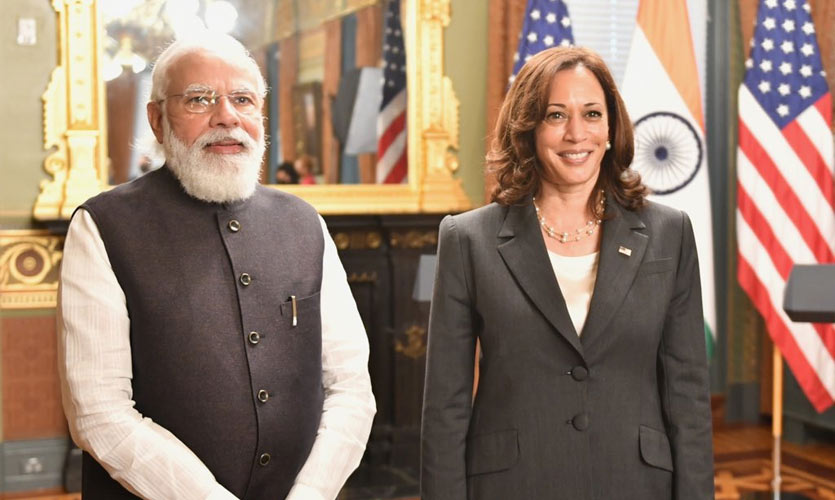Pakistan’s role in terrorism was one of the key points of discussion during Prime Minister Narendra Modi’s maiden meeting with US Vice President Kamala Harris on September 23, in Washington, D.C. The US Vice President called upon Islamabad to take immediate actions against the terror outfits operating in Pakistan to ensure the security of both India and the United States. Harris also highlighted that Islamabad’s role in supporting terrorism and sheltering terrorists should be monitored closely.
Stating that Kamala Harris agreed on the fact that India has been a victim of terrorism for several decades, Foreign Secretary Harsh Vardhan Shringla said, “When the issue of terrorism came up, the vice president suo motu referred to Pakistan’s role in that regard.”
The foreign secretary also informed that Harris agreed that there are terror outfits based in Pakistan. “She asked Pakistan to take action so that this will not impact on US security and that of India. She agreed with the prime minister’s briefing on the fact of cross border terrorism, and the fact that India has been a victim of terrorism for several decades now and on the need to rein in, and closely monitor Pakistan’s support for such terrorist groups,” said Shringla.
Kamala Harris’s strong comments on Pakistan’s terror links came shortly after the Secretary of State, Antony Blinken appreciated Pakistan for its role in continuing diplomatic engagement over Afghanistan. Interacting with his Pakistani counterpart Shah Mahmood Qureshi, Blinken said that the United States lauds “the work that Pakistan has done to facilitate the departure of American citizens who wish to leave as well as others”. “But a lot to talk about there as well as our own bilateral relationship, including the economic relationship between our countries and working in the region as a whole,” he added.
The meeting between PM Modia and Harris, which ran over an hour long, was politically significant since the latter, a leading progressive among the Democrats, had been a vocal advocate against the Modi government’s decision to revoke Article 370 that took away the special status of Jammu and Kashmir. Harris had also severely criticised the Modi government’s enactment of the Citizenship Amendment Act (CAA). Further, Kamala Harris’ niece, Meena Harris had campaigned against Modi during the farmers protest by endorsing celebrities who came out in support of the farmers.
Interacting with PM Modi, the vice president said that it is important for both the nations to safeguard democratic principles and institutions at home and around the world. “As democracies around the world are under threat, it is imperative that we defend democratic principles and institutions within our respective countries and around the world… and that we maintain what we must do to strengthen democracies at home and it is incumbent on our nations to of course protect democracies in the best interests of people of our countries,” said Harris.
Read more: What Do World Leaders Have To Say About The Crisis In The Middle East And Afghanistan?
Recalling his earlier telephonic interaction with Harris in June, Prime Minister Modi described her as an “inspiration for many across the world”, and a “true friend” who spoke like “family”. “One of our interactions happened when India was battling a very tough wave of COVID-19 infections. I recall your kind words of solidarity that time,” said the prime minister, adding, “Like a family, the sense of kinship and so warmly, you extended a helping hand, the words that you chose when you spoke to me, I will always remember that, and I’d like to thank you from the bottom of my heart. Like a true friend, you had given a message of cooperation, and were very full of sensitivity and immediately after that we found that the US government, the US corporate sector and the Indian community, all came together to help India.”
Stating that India and America are “natural partners”, PM Modi said, “The oldest democracy and the largest democracy… we are indeed natural partners, we have similar values.” Vice President Harris also stressed on the need for a free and open Indo-Pacific region. The United States has been trying to strengthen ties with its allies in the region to counter the aggressive moves by China, which claims nearly whole of the disputed South China Sea. However, Taiwan, Brunei, Malaysia, the Philippines and Vietnam have been protesting China’s advances.
During the first day of his US visit, PM Modi also held bilateral talks with Australian Prime Minister Scott Morrison and Japanese Prime Minister Yoshihide Suga. Speaking to reporters on PM Modi’s interaction with his Australian and Japanese counterparts, Shringla said, “They discussed a broad range of issues, which covered bilateral, regional, and global issues of mutual interest. They noted with satisfaction the high level engagement between the two countries.”










